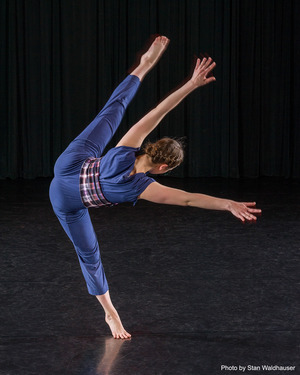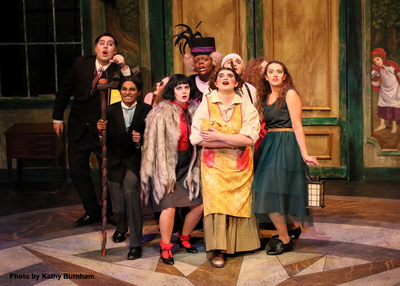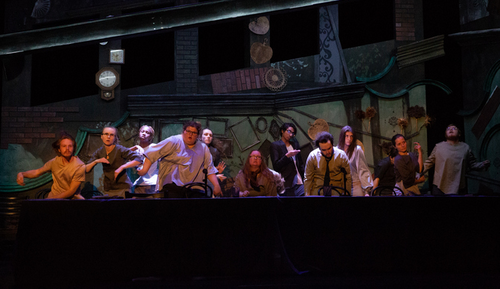Theatre and Dance Department Overview
Philosophy

Theatre and dance are performing arts that present imaginative worlds to the senses. Because they invite us to create, shape, and communicate our understandings of identity and value, they also help us make sense of the world around us. And because they involve us as individuals and as a community in ongoing journeys of making and sharing, forming and performing, viewing and reviewing, theatre and dance also have the power to change lives. As a faculty, we are committed to sharing the joys of discovery, the rigors of craft, and the insights of criticism. We believe in making performances that are both challenging and entertaining for our students and for the greater community.
Mission
The Department of Theatre and Dance involves students in creative inquiry, embodied knowledges, inventive collaboration and skillful expression of ideas in order to prepare them for lives of leadership, service, and excellence in the arts, culture and business of the future. Each student in Theatre and Dance explores performance, design, technology and research in a multifaceted liberal arts context. Theatre and Dance students acquire foundational skills in multiple aspects of performance and production. Majors are also expected to immerse themselves in the history, theory and literature of their art form in order to develop individual identities as artist-thinkers.
The Department's mission emphasizes the value of performance as a vital means of working for social justice and personal transformation.
The Department mentors majors and non-majors alike in explorations of the many ways theatre and dance artists interpret and affect society. Students and faculty collaborate on creative research projects designed to raise awareness, create community, foster self-expression, challenge stereotypes, evoke compassion, and represent diverse perspectives. Advanced seminars and capstone experiences enable students to develop and articulate their own unique senses of vocation, purpose and creative vision for life and art beyond college
Theatre and Dance Department performance events entertain and challenge Gustavus audiences with dynamic, innovative productions. The department also seeks to serve the greater St. Peter community with the artistic excellence and educational outreach so important to our work. The Department is committed to being a resource for the expression of community concerns, histories, and story-telling.
The Department’s program prepares students for graduate study and/or for professional work in the fields of Theatre and Dance. It also provides students with experience and confidence with collaboration, creative imagination, self-expression, problem-solving, critical analysis and empathy—abilities crucial to every walk of life.
 Facts and History
Facts and History
The department of theatre and dance had its genesis in the study of speech, rhetoric and debate, all popular subjects at Gustavus at the turn of the last century. For many years, the primary instructors in the then Speech Department were the legendary couple, Evan and Evelyn Anderson. Upon the arrival of Robert Gardner in the fall of 1971 to join “Mrs. A.”, the Speech and Theatre Department consisted of two faculty members teaching in speech and two faculty members in theatre. A third faculty member, Kelly W. Forde, joined Anderson and Gardner in 1972 as faculty designer/technical director. The ensuing years saw the continued expansion of the department and its subsequent separation from the Speech Department in the late 1970’s. Formal dance classes were added to the curriculum in the mid-1970’s with the first fulltime dance instructor joining the department in 1979. Dance was added to the formal title of the department in the early 1990’s to recognize the department’s commitment to dance.
The theatre and dance department has been housed in several temporary locations on campus. Anderson Theatre, our current venue, opened in the fall of 1971 and the “Little Theatre”, located behind the current Jackson Campus Center, was torn down in the late 1970’s. The building has undergone few changes with exception of the removal of the large panels which closed-off the proscenium arch in Anderson and the addition of the Kresge Studio in the early 1980’s with funds from the Kresge Foundation.
Of our current faculty, Michele Rusinko has the longest history with the department, taking over the Dance program in 1984 and Terena Wilkens became Technical Director in 1994. Performance for social justice was an important focus for Vanita Vactor, who came to the department as a visiting fellow and director from 1994 to 1997. In 1997, director Amy Seham joined the faculty, specializing in improvisation, directing, and theatre for social justice. In the mid-2000's, a new wave of faculty and staff joined the program, including costumer, Larissa McConnell, director/historian Henry MacCarthy, designer Micah Maatman, dance professor Melissa Rolnick, and Administrative Assistant Kristi Borowy.
Theatre and Dance facilities escaped major damage by the 1998 tornado, although almost all of the electrical and sound equipment needed to be replaced. In 2007 thanks in part to our wonderful alumni and a grant from the Tozer Foundation, Anderson Theatre received a state-of-the-art lighting system complete with a new computer lighting console and double the number of dimmers.
In the fall of 2019, the Nobel Hall renovation connected Nobel Hall and Schaefer Fine Arts Center with a brand new  laboratory theatre where students can conduct their own experiments in performance, design and technology alongside our science colleagues. The department is thrilled and thankful to have this performance and classroom space where students can imagine, discover, create, and collaborate. The space includes an accessible lab space specifically created for theatre and dance classes focusing on performance, directing, dance, design, and technical production. The theatre is adaptable for nearly every style of performance, exposing students and audiences to a wider variety of performance practices. This space provides state-of-the-art tools and equipment to stay on the leading edge of education and training for the next generations of Gustie artists. Besides the theatre itself, the addition included a scene shop, dressing rooms, costume, hair and make-up room, and new dye vat for bulk dyeing of costumes. In February 2020, the theatre was officially named the Rob and Judy Gardner Laboratory Theatre, after long-time theatre professor Rob Gardner and his wife.
laboratory theatre where students can conduct their own experiments in performance, design and technology alongside our science colleagues. The department is thrilled and thankful to have this performance and classroom space where students can imagine, discover, create, and collaborate. The space includes an accessible lab space specifically created for theatre and dance classes focusing on performance, directing, dance, design, and technical production. The theatre is adaptable for nearly every style of performance, exposing students and audiences to a wider variety of performance practices. This space provides state-of-the-art tools and equipment to stay on the leading edge of education and training for the next generations of Gustie artists. Besides the theatre itself, the addition included a scene shop, dressing rooms, costume, hair and make-up room, and new dye vat for bulk dyeing of costumes. In February 2020, the theatre was officially named the Rob and Judy Gardner Laboratory Theatre, after long-time theatre professor Rob Gardner and his wife.